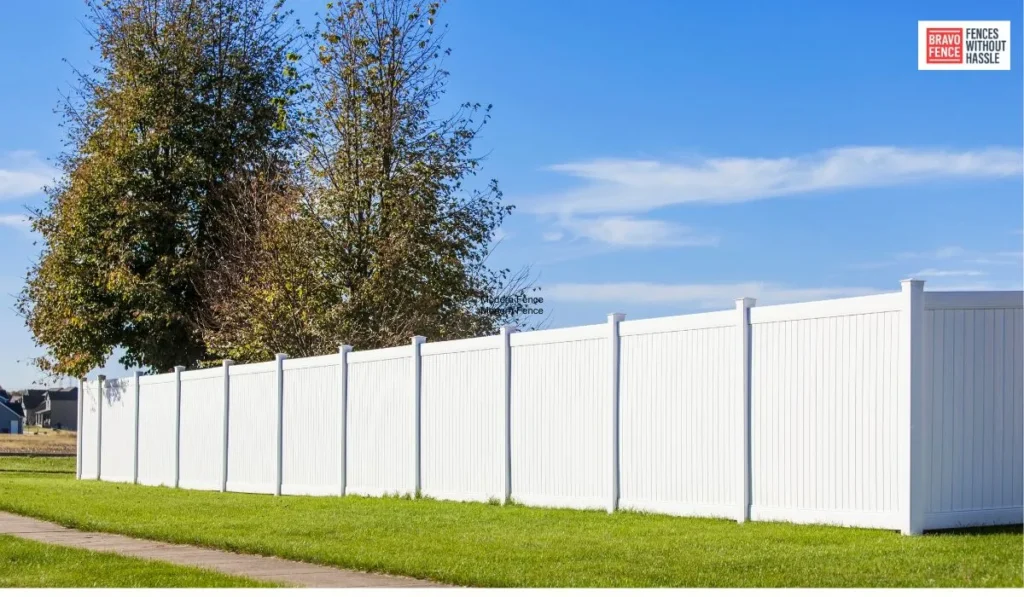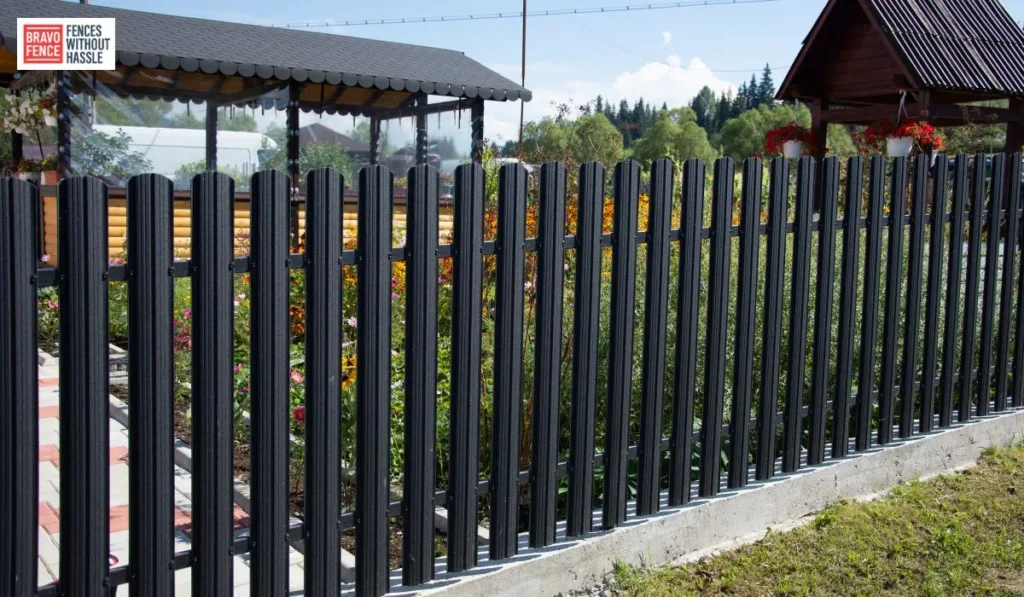Installing a new fence on your property? Your head might already be spinning with options! Most homeowners like the look of traditional wood fences. But that look can be achieved with a variety of materials! Let’s take a look at how a wood vs. vinyl vs. composite fence could work best for your property.
Wood Fencing
There are many options when it comes to choosing a fence. But there is something to be said for the classic simplicity of a wooden fence. Wood is probably the oldest material for fences, aside from stone, and it has continued to be a favorite. Wood also offers a wide variety of sizes, styles, and color options. Wood is easy to work with and, when appropriately treated, holds up to the elements pretty well.
If you’re looking for a traditional style for your yard, wood is ideal. Wooden fences remind people of the fences they had as kids. A tall wooden privacy fence is one of the hallmarks of suburban living. If you want something more rural, or need to cover a broader stretch of land, a split rail fence is an excellent choice. Or, if the classic Americana is what you’re going for, there’s nothing more perfect than a white wood picket fence.
Wood is exceptionally versatile. It can be painted, stained, or treated with a clear finish to bring out its natural beauty. If you like, you can even leave your fence untreated to get that faded gray look of wood exposed to the elements.
Vinyl Fencing
Vinyl can stand up to the punishment that would damage a wood fence. One of the most common sources of damage to wood fences is moisture. Even pressure-treated wood can absorb moisture over time. However, vinyl fences don’t absorb moisture. There is no danger of swelling and rot. There is no paint to blister or peel. And because vinyl is not an organic material, termites and other pests have no interest in it.
Unlike wood or metal, vinyl is flexible. But that doesn’t mean your fence will be twisting and flapping in the breeze. Rather, if you live somewhere with high winds, vinyl is a great option. In the Southeast, storms are often accompanied by strong wind gusts. Vinyl can handle wind exceptionally well because it isn’t as rigid as other materials. Vinyl also comes in a wide variety of colors and styles, often made to mimic the look of wood. For example, you could install a white vinyl picket fence and no one would ever know it isn’t wood!
Composite Fencing
Composite fencing is made of a combination of plastic and wood fibers. Depending on the manufacturer, composite fencing is available in individual boards or panels. Virtually any fence style that can be created with wood can also be created with composite materials, including privacy fences and good neighbor fences. Meanwhile, fiber-reinforced composites, while expensive, present several advantages over their wood counterparts. They last longer, require much less maintenance and can save you money in the long term.
How They Stack Up: Wood Vs. Vinyl Vs. Composite Fence
It can be hard to compare a wood vs. vinyl vs. composite fence one against the other. Instead, we’ll provide you with some important information to help you decide what’s best for your property and budget. Since these are three very popular fencing materials, you really can’t go wrong.
Pros: Wood
Wood is by far the most affordable option of these three choices. Although recent manufacturing and supply-chain issues have rocked the construction world, wood prices have stabilized. Wood is also the most versatile option, and the easiest to update. While you can select a composite or vinyl fence in a variety of colors, you really can’t change your mind later. However, a wood fence can always be stripped and repainted to match your evolving tastes.
Pros: Vinyl
Vinyl is a much stronger option than wood. It is also incredibly low-maintenance. Give a vinyl fence a good wash with some soap and a hose or power washer once a year and you’re set! Vinyl fencing production has improved over the last decade. Now, vinyl fences are high-quality and look beautiful. Additionally, if you live in a fire-prone area, vinyl is a safe choice. One of the pros of installing a vinyl fence is that it’s classified as “self-extinguishing,” making it safer against fire than a wood fence. PVC has a flashpoint of approximately 900 degrees and does not easily ignite.
Pros: Composite
Composite fencing is one of the most eco-friendly choices for wood fencing. It is made of wood fibers mixed with recycled plastic, and it’s a great way to use both recycled plastic and bits of wood that are often treated as waste. It is also one of the most sturdy fencing materials. Due to its plastic content, composite or manufactured wood is not subject to much of the regular aging that affects natural wood. Many composite and manufactured wood fences even come with warranties. Because it is manufactured, composite wood fences can mimic the look of many other types of wood.
Cons: Wood
Depending on the type of wood, you may be looking at a very expensive option. For example, tropical hardwood fencing is the most expensive option for a wooden fence. Also, wood is not a very eco-friendly option, as redwood and some tropical hardwoods are subject to over-logging or may be taken from endangered forests. Lastly, wood requires much more maintenance than vinyl and composite fences. Thus it loses out in the durability category of wood vs. vinyl vs. composite fence.
Cons: Vinyl
Due to production and supply chain issues caused by the global pandemic, vinyl fencing supplies are becoming rare. Thus, they are also becoming much more expensive. Unfortunately, for this reason, it may be difficult or expensive to install a vinyl fence anytime soon.
Cons: Composite
Although it comes in a wide variety of colors and textures, it is prone to fading in the sun. Also, composite fence materials are more expensive than wood options. For most homeowners, this material is cost-prohibitive. Hopefully, as manufacturing ramps up, and as people see the ecological benefit of these materials, we will see prices drop.
Takeaways: Choosing a Wood Vs. Vinyl Vs. Composite Fence
There are lots of factors to consider when installing a new fence on your property. Aside from the fun of aesthetics – choosing styles and colors – are also the practicalities. You need to find a fence that will work for your budget, your maintenance abilities, and your climate.
Our experienced team at Bravo Fence Company can help guide you through each of these details. We’ve built preferred customer status with major fence suppliers and manufacturers so we can offer the best products and pricing to our customers. With Bravo Fence Company, you’re not just shopping a product off the shelf. You are buying a fence that is designed, formulated, and installed with thoughtfulness in mind. Reach out today for a free estimate for your fencing project!





